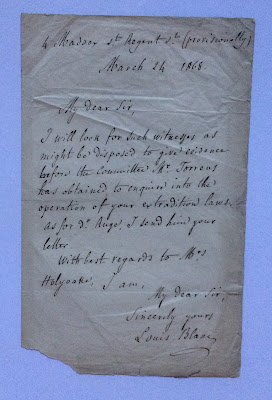 |
| Louis Blanc in 1850 from his book Organisation du Travail, published in Paris by Nouveau Monde |
While living in exile, first in London and then Brighton, Blanc worked on a series of histories of the French Revolution and the events of 1848 which ensured him a continuing profile in France throughout the period of the Second Empire. But he also engaged to a limited extent with British politics.
One of his closest British associations was with George Jacob Holyoake, who would later write in his autobiography Sixty Years of an Agitator’s Life: “Louis Blanc I knew during all the years of his exile, and was invited by his family to his burial in Pere la Chaise.”
Holyoake was a great admirer or Blanc, writing that “next to Mazzini, he was master, not only of the English tongue, but of English ways of thought, and understood the land”. He had, declared Holyoake, “conscious power which needed no assertion”.
Clearly the two men were on friendly terms. The letter shown here from Blanc to Holyoake sends, as an aside, his “best regards to Mrs Holyoake” (click for a larger version).
Dated 1868, by which time Blanc had been in Britain for two decades, and sent from a central London address (Maddox Street still exists, but has been completely rebuilt since then), the letter shows that the author still had strong connections with the exile community.
Apparently responding to a request by Holyoake, Blanc promises to find witnesses to go before a parliamentary committee chaired by William McCullagh Torrens, a Liberal MP who was opposed to changes to extradition laws that he feared meant allying with oppressive European states.
Blanc did eventually return to France, but not until the fall of the Second Empire in 1870. After serving briefly as a private in the National Guard, he was elected to the National Assembly.
Blanc had little sympathy with the Paris Commune, but in 1879 successfully proposed an amnesty for the Communards. It was to be his last major political intervention before his death in 1882. Holyoake later recalled: “It seemed as though all Paris followed him to the tomb.”
The letter in full
The letter is surprisingly clear and easy to read. It reads:“4 Maddox St, Regent St (provisionally) / March 24 1868 / My dear Sir / I will look for such witnesses as / might be disposed to give evidence / before the committee Mr Torrens / has obtained to enquire into the / operation of your extradition laws. /As for Mr Angel, I send him your / letter. / With best regards to Mrs / Holyoake / I am, / My dear Sir, / Sincerely yours / Louis Blanc

No comments:
Post a Comment